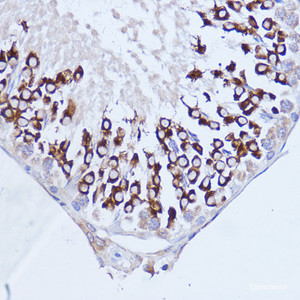CAPN1 Polyclonal Antibody | G-AB-01953
Gentaur Antibodies
- SKU:
- G-AB-01953
- Availability:
- 3 to 5 Working Days
- Host:
- Rabbit
- Reactivity:
- Human, Mouse, Rat
CAPN1 Polyclonal Antibody | G-AB-01953 | Gentaur Antibodies
Overview: The calpains, calcium-activated neutral proteases, are nonlysosomal, intracellular cysteine proteases. The mammalian calpains include ubiquitous, stomach-specific, and muscle-specific proteins. The ubiquitous enzymes consist of heterodimers with distinct large, catalytic subunits associated with a common small, regulatory subunit. This gene encodes the large subunit of the ubiquitous enzyme, calpain 1. Several transcript variants encoding two different isoforms have been found for this gene.
Category Type: Polyclonal Antibody
Research Areas: Cancer, Cell Biology, Signal Transduction
Synonyms: Ca2 activated neutral protease, Calcium activated neutral proteinase, Calcium activated neutral proteinase small subunit, Calcium dependent protease small subunit 1, Calcium dependent protease small subunit, Calcium-activated neutral proteinase 1, Calpain 1, Calpain 1 large subunit, Calpain 1, (mu/I) large subunit, Calpain mu type, Calpain mu-type, Calpain regulatory subunit, Calpain small subunit 1, Calpain, large polypeptide L1, Calpain-1 catalytic subunit, Calpain-1 large subunit, CAN1, CANP 1, CANP, CANP small subunit, CANP1, CANPL 1, CANPL1, CAPN 1, CAPN1, Cell proliferation inducing protein 30, Cell proliferation-inducing gene 30 protein, Micromolar Calpain, Micromolar-calpain, Mu Calpain, muCANP, muCL
Reactivity: Human, Mouse, Rat
Host: Rabbit
Isotype: IgG
Gene ID:
Accession #: BC017200
Clonality: Polyclonal
Immunogen: Recombinant protein of human CAPN1
Clone #:
Conjugation: Unconjugated
Swissprot: P07384
Santa Cruz: sc-7531/sc-31066/sc-31065/sc-7530/sc-13990
Calculated MW: 82 kDa
Observed MW:
Concentration: 0.3 mg/mL
Buffer: PBS with 0.05% sodium azide and 50% glycerol, PH7.4
Purification method: Affinity purification
Application: WB, ELISA
Dilution: WB 1:200-1:1000
Storage: Store at -20°C. Avoid freeze / thaw cycles.












